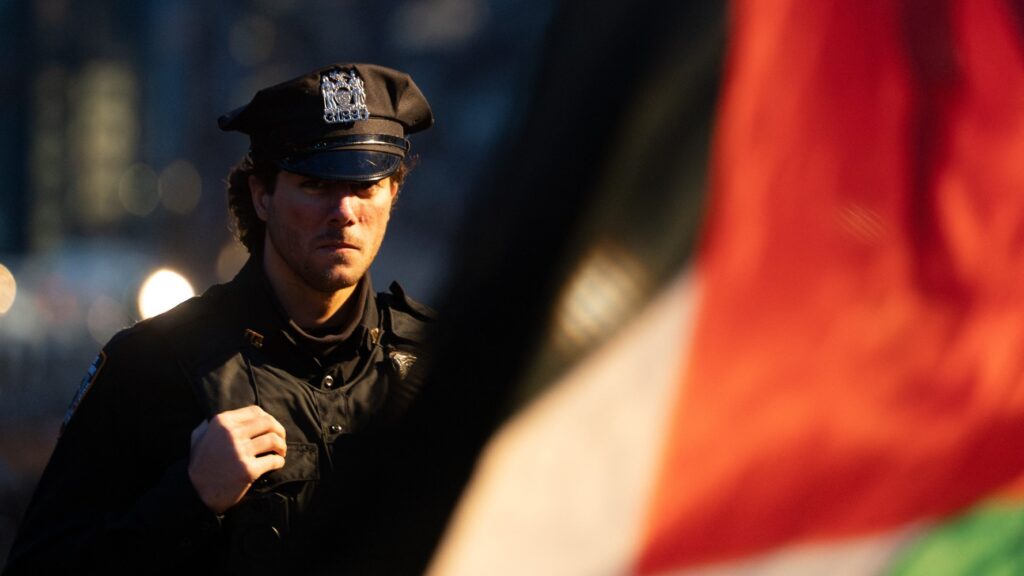On a sweltering day in the summer of 2020, protesters in cities around the world hoisted cardboard signs reading “Defund Police” and “Abolish Police”.
They demanded an end to state violence and racist policing, their voices ignited after the high-profile killings of Black Americans and the birth of a global movement for justice.
Five years later, as debates over public safety still rage and political leaders largely double down on law and order, a new book arrives to fuel the fire for change.
Their End Is Our Beginning: Cops, Capitalism, and Abolition by Brian Bean is a passionate, clear-eyed analysis that tackles the roots of policing and boldly envisions a future without it.
This appreciative review explores Bean’s key arguments, his narrative style and structure, the author’s background, and the vital context that makes his book so timely and significant.
New MEE newsletter: Jerusalem Dispatch
Sign up to get the latest insights and analysis on
Israel-Palestine, alongside Turkey Unpacked and other MEE newsletters
At its core, Their End Is Our Beginning is a candid examination of how modern policing developed alongside capitalism – and why that connection is significant today.
Bean begins by posing fundamental questions that get to the heart of the matter: Where do cops come from, and what do they really do? How did “modern policing” as we know it come to be, and why does the capitalist state appear to require policing?
In exploring these questions, he provides what the publisher describes as “a clear and comprehensive account of why and how the police – the linchpin of capitalism – function and exist”, ultimately presenting “a clear case for the abolition of policing and capitalism”.
The book traces the historical roots of policing through colonial rule, racist enslavement and class oppression, demonstrating that, rather than being neutral crime-fighters, police forces were established to maintain a social order built on exploitation.
From armed patrols that enforced slavery in the Americas to the colonial constabularies that subdued subject peoples, Bean illustrates that policing has consistently served as a tool to protect the powerful.
The book’s argument is unapologetically radical in its conclusion: policing isn’t a public service gone awry but a pillar of a system built on inequality.
Drawing from a Marxist perspective, he argues that the police exist primarily to “hold a capitalist order together”, defending property, privilege and power at the expense of marginalised communities.
As one reviewer bluntly summarises, Bean shows that police today are “little more than glorified guardians of whiteness and wealth”.
In other words, cops don’t merely uphold racial and economic hierarchies; that’s their core function.
Because of this role, Bean contends that meaningful change cannot come from piecemeal reforms. Indeed, he writes that policing was never truly about preventing harm in the first place – it was about preserving an unjust status quo.
A socialist analysis of the state
Despite the heavy topic, Bean’s narrative style is highly accessible and engaging. He writes with clarity and purpose, avoiding academic jargon while grounding his analysis in deep research and theory.
The prose strikes a balance between fiery conviction and explanatory patience, making complex ideas accessible to a general audience.
For example, when debunking common myths about the necessity of police, Bean uses real cases and statistics (from mental health crises to domestic disputes) to demonstrate that armed officers often exacerbate situations – evidence that our reliance on policing in times of crisis is misguided.
Bean’s position is crystal clear: the end of policing and the end of capitalism are intertwined, and from their end can emerge our beginning as a truly free society
This kind of explanation, seamlessly woven into the storytelling, exemplifies Bean’s journalistic approach.
Their End Is Our Beginning reads not like a dry scholarly tome but as a compelling piece of long-form reporting – one that just happens to include a socialist analysis of the state.
The structure of the book mirrors the logical flow of his case: first unravelling the past to understand how we arrived here, then examining the current machinery of policing, and finally looking ahead at how we can break this cycle for a better future.
By the end, Bean’s position is crystal clear: the end of policing and the end of capitalism are intertwined, and from their end can emerge our beginning as a truly free society.
Global resistance
One of the most compelling aspects of Bean’s book is how it goes beyond theory and US history, drawing on global lessons of revolt and resistance.
This isn’t just a critique of American policing in isolation; Bean zooms out to show that people worldwide have challenged police power and – in moments of crisis – managed without police altogether.
Through extensive interviews with activists from Mexico to Ireland to Egypt, he brings in voices from the front lines of struggles against state violence.
Importantly, these global stories aren’t just triumphant anecdotes; Bean uses them to explore the challenges and possibilities of abolition. The activists he interviews reflect on what it truly takes to keep a community safe without an armed force, whether through mutual aid networks, civilian patrols or rapid-response mediation teams.
Their successes and setbacks add nuance to the meaning of “solidarity” and provide clarity to what “abolition” and “revolution” look like in practice.
For instance, an organiser from Egypt might describe how, during the 2011 uprising, when police withdrew from parts of Cairo, ordinary citizens self-organised to direct traffic and protect neighbourhoods, a real-world glimpse of community safety beyond policing.
An activist from Ireland could recount resisting British colonial-era police tactics or sectarian surveillance, illustrating the link between policing and imperialism.
In Mexico, campaigners against state violence shed light on how communities respond when official law enforcement is synonymous with corruption or brutality.
By weaving these diverse experiences together, Bean transforms abstract concepts into a concrete, relatable reality.
Readers not only learn that abolition can work but also feel the hope and urgency of those who have fought for it on the ground.
The book’s narrative gains a rich, global texture; one moment taking us through the history of London’s first bobbies or the slave patrols of the American South, the next moment dropping us into a conversation with youth organisers in an Irish housing estate or a protest leader in Mexico City.
This interplay of analysis and testimony is one of Bean’s strengths. It underscores a crucial point: the movement to abolish policing is international, and activists are learning from each other across borders.
What emerges is a shared “revolutionary logic”, a sense of common purpose and strategy, that Bean argues is needed for collective liberation.
The book’s global scope not only reinforces the universality of the problems with policing but also the universality of human aspirations for justice and dignity.
An activist author with vision
It’s no surprise that Their End Is Our Beginning is both fiery and finely detailed. Bean brings years of activist experience and research to its pages.
Based in Chicago, Bean is a socialist activist, writer and speaker with roots in grassroots organising that clearly inform his work.
Originally from North Carolina, he honed his political skills on campaigns for racial and economic justice, eventually becoming one of the founding editors of Rampant magazine, a publication known for its leftist, abolitionist perspectives.
Over the years, Bean’s writings have appeared in outlets such as Jacobin, marking him as a prominent voice in contemporary socialist debates.
He previously co-edited Palestine: A Socialist Introduction (Haymarket, 2021), reflecting his involvement in international solidarity movements as well.
Such a background gives Bean unique credibility and passion regarding policing and capitalism.
He isn’t an ivory-tower academic writing in isolation; he’s been in the streets and community meetings, grappling with the very issues his book addresses.
Bean’s activist pedigree shines through in the narrative style and perspective of the book. He writes with the urgency of someone who has witnessed injustice first-hand, yet he also employs a reporter’s keen eye for detail and evidence.
The result is a voice that is both authoritative and approachable. When Bean argues that the police are fundamentally a tool of class rule, he does so not only with theory, but with examples a reader can visualise – and he speaks “on our own terms”, as one reviewer noted of his uncompromising tone.
His lived experience in movements enables him to anticipate the reader’s doubts and questions, addressing them directly: Is abolition actually practical? What about violent crime? Don’t we need someone to call in an emergency?
Bean tackles these common questions, offering thoughtful rebuttals and alternative solutions.
Yet for all his radicalism, Bean’s approach is underscored by deep empathy.
He centres the voices of people harmed by policing and those envisioning new forms of safety, allowing their humanity to ground the politics.
It’s clear that Bean sees his book as a tool for the movement – a way to educate, inspire and ultimately galvanise readers into action.
Abolitionism in 2025
The book arrives at a critical moment in the political and social landscape. In the aftermath of the 2020 uprisings against police brutality.
When Minneapolis demonstrators famously burned down a police precinct and “shook the world”, there was a surge of public interest in defunding or even abolishing the police.
Abolitionist ideas that once existed on the fringes suddenly became part of mainstream discourse, voiced in city council meetings and on national television.
However, the years since have seen a fierce backlash from political and economic elites.
Bean’s work not only diagnoses the problem – it inspires action and hope
Leaders across the spectrum have largely united around a message that the protesters were misguided.
In this charged context, Bean’s work not only diagnoses the problem – it inspires action and hope.
He shows that the abolitionist movement is far from a fringe fantasy; it is rooted in traditions of resistance that span generations and continents.
He also addresses the fears and uncertainties many people have. What would a world without police look like? Bean invites readers to actually imagine the answer.
The book’s title itself, Their End Is Our Beginning, encapsulates a hopeful vision: the end of “their” system of policing and profit could be the beginning of our new society built on justice, care and true public safety.
It’s a rallying cry to see beyond the present and to recognise that every time people have pushed back, whether it was enslaved people rebelling for freedom, colonised nations fighting for independence, or modern citizens demanding investments in housing and mental health instead of militarised cops, they were chisseling away at the pillars of an old world and clearing ground for something new.
Their End Is Our Beginning: Cops, Capitalism, and Abolition by Brian Bean will be launched in July 2025, and is currently available for pre-order from Haymarket Books.




